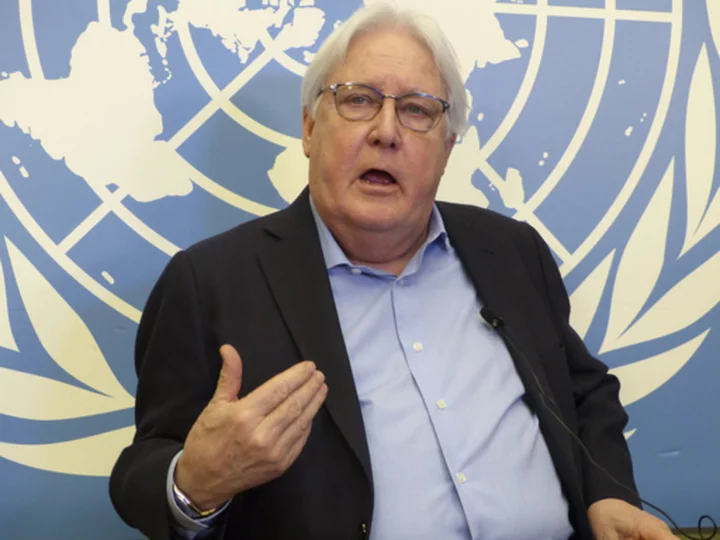China asked former British trade secretary Peter Mandelson to urge foreign business to return or expand to the world’s second largest economy, as it battles a disappointing post-pandemic recovery.
The British politician and former European trade commissioner said that was the overwhelming message during his week in Beijing talking to policymakers, including Liu Jianchao, head of the Communist Party’s International Department.
To achieve that goal, China must take “clear actions to make it easier to do business in China,” Mandelson, chairman and co-founder of advisory firm Global Counsel LLP, said on Friday, in an interview from the capital.
Mandelson’s trip came as China last week welcomed a string of business leaders including Tesla Inc.’s Elon Musk and Jamie Dimon, chief executive officer of JPMorgan Chase & Co., in an effort to allay fears the country is becoming hostile to foreign capital. Delegations from dozens of Chinese cities and provinces have hosted overseas roadshows this year seeking out investment.
Since Mandelson held a virtual dialogue in 2021 between some 25 European executives and senior Chinese officials including then-premier Li Keqiang — a forum he is hoping to repeat — a spate of regulatory crackdowns and rising geopolitical tensions have spooked investors.
In the comments below, condensed for brevity, Mandelson discusses the risks and opportunities for international business.
What did you learn from your trip?
Economic recovery and revival is the top priority. Covid controls projected an image of tight security and control in China being operated by a very centralized state system. Now they want to emphasize the dynamism of the economy and the role that the private sector and foreign direct investment can play in it.
The message to me very strongly was: “We want foreign investment. Please encourage people either to return or to expand.” But here’s the point that I made: it’s very important for China’s authorities not just to talk at foreign investors, but to listen to what they’re saying about the need for reform.
There’s a feeling that the authorities are good at making speeches and less good at following them up with clear actions.
What are the challenges for international business?
There’s a lot of bureaucracy, layers of government, and now a new dimension of data regulation and control. Chinese authorities have got to be very careful that, while they are entitled to manage the economy in aspects like data in an appropriate way, the cumulative impression or impact is not off-putting to private investors.
China has gone through a period when the messaging from Beijing has been quite nationalistic, a lot more about state enterprise than private enterprise. A rebalancing is necessary in order to send the right signals to international companies.
What’s the response from officials when you raise these concerns?
They agree, but as I say, it has to be followed up with actions. People are looking for a specific follow-ups. Look, they have to understand that Western international companies fear being stranded if a conflict breaks out between the US and China, so they’re tempted to hedge their bets to shrink their exposure.
And where does the US stand in all this?
The United States says that its aim is not a decoupling of the West from China. The fear of many, as it has been put to me in the business community, is that while this may not be the aim of American actions, decoupling may be the consequence.
There’s a feeling that perhaps the United States may be over overreaching, that it may be contributing to instability, as some of international businesses have been putting it to me.
Are there other geopolitical concerns?
One thing, of course, is the war in Ukraine. I was quite surprised by one senior political figure telling me forthrightly that Russia is not an ally of China. He said, China is not tied to Russia in the way Britain and other allies are to our NATO partners in a military alliance. It seems that Chinese views about Russia’s invasion of Ukraine are more nuanced than sometimes appears.
Did you discuss Taiwan?
I put it to a senior political figure that it would be helpful if China could make clear that it had no intentional plan to take Taiwan by force. But their analysis, as it was explained to me, is if they publicly renounce the use of force, then those advocating independence will see no impediment or cost in organizing for it.
I can see the logic of this position, but equally, I think China must find a peaceful way forward and make it clear that this is their aim.
There’s been a tendency to read across from Ukraine to Taiwan and a lot of fears are being whipped up over Taiwan. Of course, there are going to be continuing tensions. But I think that very clearly, as was said to me, China does not want to see Chinese fighting Chinese in or over Taiwan.
--With assistance from Ros Krasny.
(Adds context on Chinese investment roadshows in fourth paragraph and details througout.)









